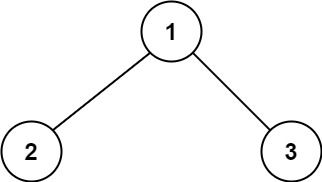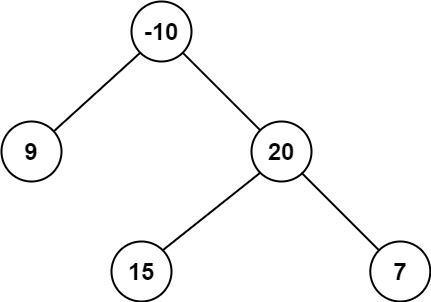| comments | difficulty | edit_url | tags | ||||
|---|---|---|---|---|---|---|---|
true |
困难 |
|
二叉树中的 路径 被定义为一条节点序列,序列中每对相邻节点之间都存在一条边。同一个节点在一条路径序列中 至多出现一次 。该路径 至少包含一个 节点,且不一定经过根节点。
路径和 是路径中各节点值的总和。
给你一个二叉树的根节点 root ,返回其 最大路径和 。
示例 1:
输入:root = [1,2,3] 输出:6 解释:最优路径是 2 -> 1 -> 3 ,路径和为 2 + 1 + 3 = 6
示例 2:
输入:root = [-10,9,20,null,null,15,7] 输出:42 解释:最优路径是 15 -> 20 -> 7 ,路径和为 15 + 20 + 7 = 42
提示:
- 树中节点数目范围是
[1, 3 * 104] -1000 <= Node.val <= 1000
我们思考二叉树递归问题的经典套路:
- 终止条件(何时终止递归)
- 递归处理左右子树
- 合并左右子树的计算结果
对于本题,我们设计一个函数
函数
如果
否则,我们递归计算
然后,我们用
在主函数中,我们调用
时间复杂度
# Definition for a binary tree node.
# class TreeNode:
# def __init__(self, val=0, left=None, right=None):
# self.val = val
# self.left = left
# self.right = right
class Solution:
def maxPathSum(self, root: Optional[TreeNode]) -> int:
def dfs(root: Optional[TreeNode]) -> int:
if root is None:
return 0
left = max(0, dfs(root.left))
right = max(0, dfs(root.right))
nonlocal ans
ans = max(ans, root.val + left + right)
return root.val + max(left, right)
ans = -inf
dfs(root)
return ans/**
* Definition for a binary tree node.
* public class TreeNode {
* int val;
* TreeNode left;
* TreeNode right;
* TreeNode() {}
* TreeNode(int val) { this.val = val; }
* TreeNode(int val, TreeNode left, TreeNode right) {
* this.val = val;
* this.left = left;
* this.right = right;
* }
* }
*/
class Solution {
private int ans = -1001;
public int maxPathSum(TreeNode root) {
dfs(root);
return ans;
}
private int dfs(TreeNode root) {
if (root == null) {
return 0;
}
int left = Math.max(0, dfs(root.left));
int right = Math.max(0, dfs(root.right));
ans = Math.max(ans, root.val + left + right);
return root.val + Math.max(left, right);
}
}/**
* Definition for a binary tree node.
* struct TreeNode {
* int val;
* TreeNode *left;
* TreeNode *right;
* TreeNode() : val(0), left(nullptr), right(nullptr) {}
* TreeNode(int x) : val(x), left(nullptr), right(nullptr) {}
* TreeNode(int x, TreeNode *left, TreeNode *right) : val(x), left(left), right(right) {}
* };
*/
class Solution {
public:
int maxPathSum(TreeNode* root) {
int ans = -1001;
function<int(TreeNode*)> dfs = [&](TreeNode* root) {
if (!root) {
return 0;
}
int left = max(0, dfs(root->left));
int right = max(0, dfs(root->right));
ans = max(ans, left + right + root->val);
return root->val + max(left, right);
};
dfs(root);
return ans;
}
};/**
* Definition for a binary tree node.
* type TreeNode struct {
* Val int
* Left *TreeNode
* Right *TreeNode
* }
*/
func maxPathSum(root *TreeNode) int {
ans := -1001
var dfs func(*TreeNode) int
dfs = func(root *TreeNode) int {
if root == nil {
return 0
}
left := max(0, dfs(root.Left))
right := max(0, dfs(root.Right))
ans = max(ans, left+right+root.Val)
return max(left, right) + root.Val
}
dfs(root)
return ans
}/**
* Definition for a binary tree node.
* class TreeNode {
* val: number
* left: TreeNode | null
* right: TreeNode | null
* constructor(val?: number, left?: TreeNode | null, right?: TreeNode | null) {
* this.val = (val===undefined ? 0 : val)
* this.left = (left===undefined ? null : left)
* this.right = (right===undefined ? null : right)
* }
* }
*/
function maxPathSum(root: TreeNode | null): number {
let ans = -1001;
const dfs = (root: TreeNode | null): number => {
if (!root) {
return 0;
}
const left = Math.max(0, dfs(root.left));
const right = Math.max(0, dfs(root.right));
ans = Math.max(ans, left + right + root.val);
return Math.max(left, right) + root.val;
};
dfs(root);
return ans;
}// Definition for a binary tree node.
// #[derive(Debug, PartialEq, Eq)]
// pub struct TreeNode {
// pub val: i32,
// pub left: Option<Rc<RefCell<TreeNode>>>,
// pub right: Option<Rc<RefCell<TreeNode>>>,
// }
//
// impl TreeNode {
// #[inline]
// pub fn new(val: i32) -> Self {
// TreeNode {
// val,
// left: None,
// right: None
// }
// }
// }
use std::cell::RefCell;
use std::rc::Rc;
impl Solution {
fn dfs(root: &Option<Rc<RefCell<TreeNode>>>, res: &mut i32) -> i32 {
if root.is_none() {
return 0;
}
let node = root.as_ref().unwrap().borrow();
let left = (0).max(Self::dfs(&node.left, res));
let right = (0).max(Self::dfs(&node.right, res));
*res = (node.val + left + right).max(*res);
node.val + left.max(right)
}
pub fn max_path_sum(root: Option<Rc<RefCell<TreeNode>>>) -> i32 {
let mut res = -1000;
Self::dfs(&root, &mut res);
res
}
}/**
* Definition for a binary tree node.
* function TreeNode(val, left, right) {
* this.val = (val===undefined ? 0 : val)
* this.left = (left===undefined ? null : left)
* this.right = (right===undefined ? null : right)
* }
*/
/**
* @param {TreeNode} root
* @return {number}
*/
var maxPathSum = function (root) {
let ans = -1001;
const dfs = root => {
if (!root) {
return 0;
}
const left = Math.max(0, dfs(root.left));
const right = Math.max(0, dfs(root.right));
ans = Math.max(ans, left + right + root.val);
return Math.max(left, right) + root.val;
};
dfs(root);
return ans;
};/**
* Definition for a binary tree node.
* public class TreeNode {
* public int val;
* public TreeNode left;
* public TreeNode right;
* public TreeNode(int val=0, TreeNode left=null, TreeNode right=null) {
* this.val = val;
* this.left = left;
* this.right = right;
* }
* }
*/
public class Solution {
private int ans = -1001;
public int MaxPathSum(TreeNode root) {
dfs(root);
return ans;
}
private int dfs(TreeNode root) {
if (root == null) {
return 0;
}
int left = Math.Max(0, dfs(root.left));
int right = Math.Max(0, dfs(root.right));
ans = Math.Max(ans, left + right + root.val);
return root.val + Math.Max(left, right);
}
}
